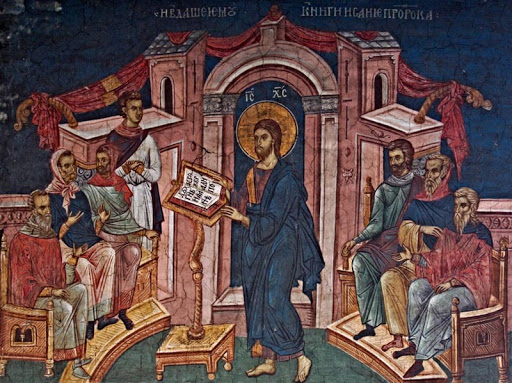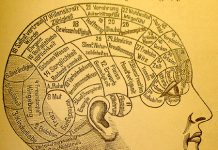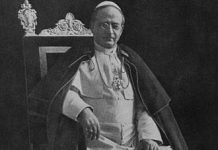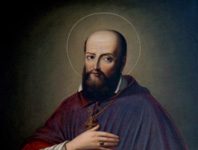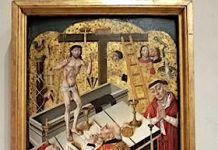For we are what He has made us, created in Christ Jesus for good works, which God prepared beforehand to be our way of life. (Eph 2:10)
Today is Laetare Sunday. It is so designated because Laetare is the first word of the Introit or Entrance Antiphon of the Mass: Laetare Jerusalem; Rejoice Jerusalem, and all who love her. In the middle of this penitential season of Lent, as we hasten towards the celebration of the Paschal Triduum with prompt devotion and eager faith, the Church reminds us that our Lord’s sacrificial death is the source of our life and that God has “raised us up with Christ and seated us with Him in the heavenly places” (Eph 2:5). All the scripture lessons of the Mass today direct our gaze upwards, beyond the here and now and even beyond what is apparent to what can only perceived by faith.
Our first reading records that after seventy long years of exile in Babylon God’s people were exhorted by Cyrus King of Persia to go up and return to Jerusalem. In the Gospel our Lord speaks of His crucifixion and directs our gaze upwards: “Just as Moses lifted up the serpent in the wilderness, so must the Son of Man be lifted up, so that whoever believes in Him may have eternal life” (Jn 3:14). We do believe in Him and for this reason not only has God “made us alive together with Christ” (Eph 2:4); He has also “raised us up with Christ and seated us with Him in the heavenly places” (Eph 2:5). Our sacramental union with Christ our Lord enables each one of us here to make our own the words of the Apostle: “I have been crucified with Christ; it is no longer I who live, but Christ who lives in me; and the life I now live in the flesh I live by faith in the Son of God, who loved me and gave Himself for me” (Gal 2:20). Our devout, active participation in the celebration of the Holy Sacrifice of the Mass enables us in mystery to be at the foot of the Cross and to be present at the lifting up of the Son of Man.
Last Sunday we reflected on the twofold nature and purpose of our worship: we are here to adore the living God who shares His life with us, and to deepen our life in Christ through our prayerful dialogue with Him, expressed through the living word that is proclaimed and explained, through sacred hymns and canticles and through ancient rites expressive of the beauty of holiness and the holiness of beauty. We are here to participate in the harmonious song of salvation. In mystery we participate already in the heavenly liturgy, the blessed communion of those who love and serve the living God in Christ. Simply stated, we endeavour to respond to Love Crucified with a crucified love. Each one of us unites his own works, her own sacrifices, our own sufferings and love to the Sacrifice of our Lord and in so doing “we complete what is lacking in Christ’s afflictions for the sake of his body, that is, the church” (Col 1:24). This in no way means that the saving Sacrifice of our Lord is in any way insufficient. Rather, we are engaged by God in the work of salvation as active participants in a mystery that unfolds in the world and in the heart of everyone who believes. This is our work. St. Paul reminds us that “we are what He has made us, created in Christ Jesus for good works, which God prepared beforehand to be our way of life” (Rom 2:10). Here is the answer to the question of life’s meaning and purpose. We are created for good works. God created us to be good and to share this goodness, and in His goodness. The Sacraments, especially the Eucharist, enable us to share in this goodness ontologically; that is to say, at the very level of our being. God transforms us from within and as this happens sacramentally, we come to appreciate and understand that the sacred liturgy, our worship, is truly the benchmark of life. Everything in the celebration of the liturgy is done in the beauty of holiness and the holiness of beauty in the hope that exposure to this Wonder before us will orient us, heal us and lift us up. Sacramentally, at the Elevation of the Mass, the Son of Man is lifted up and we look “on him whom they have pierced” (Jn 19:37).
What we participate in and gaze upon are eternal realities that are signs of authentic meaning. What is set before us, what we gaze upon manifests what it is to be authentically human. The celebration of the Sunday Mass as well as the important liturgies that mark our Christian life remind us of our part in the salvation that is unfolding inside us and around us and we come to understand even if only slightly more where we fit in the great drama of salvation. God has a plan for each one of us and though at times we may at best think that we are only stumbling along, “God who is rich in mercy” (Eph 2:4), guarantees us His grace and presence in the celebration of the sacred liturgy. What is set here before us and what we gaze upon is the path for the rest of our lives. Our love and devotion to the God who created and saved us is the only path to true human happiness and so we endeavour to respond to Love Crucified with a crucified love. Our fasting, sacrifices, prayer, self-denial and works of charity are means to one single end—our life in Christ. As we hasten toward the solemn celebrations to come, we do so with prompt devotion and eager faith; and no less with great joy at the gift of salvation that is ours in Christ Jesus our Lord.

